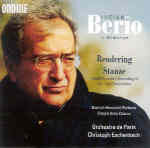Hard as it may be to believe, this is the fourth recording of Rendering, and the second by Christoph Eschenbach. It’s not all that different from the conductor’s Houston recording for Koch (coupled with Joachim’s orchestration of the Grand Duo), save for marginally swifter tempos in the second and third movements. It really is a marvellous piece. What Berio has done is take the extant sketches for what would have been Schubert’s Tenth Symphony, harmonize and orchestrate them in a reasonably idiomatic way, and then fill in the gaps with music of his own. These additions, mostly gentle in character, give notice of their presence with the addition of the celesta, and somehow the clash of harmonic sensibilities never allows the music to degenerate into a mere patchwork. It’s not at all surprising that this piece has become popular, and even though Berio recorded it himself for RCA, Eschenbach probably knows it as well as the composer, and this live performance features 100 percent commitment from all concerned.
Stanze was Berio’s last completed work (he died in 2003). It consists of five poems by five different poets, including Alfred Brendel–yes, the pianist also writes verse, often of an amusing nature. In this particular case, the poem in question is a light-hearted bit of nonsense about the discovery of the Holy Ghost within the measures of the Tritsch-Tratsch Polka. The other poets are Paul Celan, Giorgio Caproni, Edoardo Sanguineti, and Dan Pagis, making for settings in English, Italian, and German. Scored for baritone, three male choruses, and orchestra, the soloist gets most of the verse, with the choirs reinforcing various words and phrases much as did the Swingle Singers in Berio’s most famous work, Sinfonia.
Unlike Rendering, and despite the humorous Brendel setting with its obvious opportunities for musical allusion, this is one of Berio’s “sound texture” avant-garde pieces, with big gobs of dissonant tone-clusters and all kinds of unusual sounds. Despite this theoretical limitation, the music manages to be extremely evocative of its texts. The solo part in particular, though obviously excruciatingly difficult, also is often surprisingly lyrical and communicates the sense of the words quite effectively. Dietrich Henschel’s performance is extraordinary, one of the most impressive vocal displays to come along in many a moon.
Heard in concert, with the three choirs ranged about the performance space, this piece must be spectacular, and it’s scarcely less so in this impactful live recording. This isn’t easy music, but it is wonderfully written and evocative, and it’s fantastically well played. Certainly if any music of the post-World War II avant-garde deserves to survive, it is Berio’s. Billed as “Luciano Berio: In Memoriam”, this disc offers an ideal tribute to a major figure in 20th century music. [9/1/2005]
































